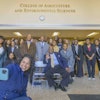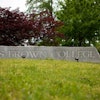In June, Dr. James A. Anderson stepped down from his post as chancellor of Fayetteville State University after 11 years at the helm. Seemingly, by every measurable metric, from enrollment, to graduation rates to financial stability and campus expansion, Fayetteville State thrived under Anderson’s leadership, innovative approach and vision, according to many on and off the campus who are familiar with his leadership.
At a time when many HBCUs experienced painfully high turnover in leadership and weathered financial and accreditation crises, Anderson’s efforts to stabilize Fayetteville State didn’t go unnoticed. Looking back, Anderson admits those were tough times. But he was up to the challenge.
In 2008, when he began as chancellor, one of Anderson’s first aims was the university’s nursing program. It was in need of resuscitating, not closure, he says. The North Carolina Board of Nursing “was getting ready to close it down, and that was partly because … the students weren’t passing the state nursing exam, and other things,” Anderson recalls. “So, I went out and found a new chair. I let the chair hire new faculty. … And now it’s just an outstanding success.”
According to NurseJournal.org, the university’s nursing program is ranked #2 among the best nursing programs in the Eastern Region, which includes half the country from Maine to Texas. That national ranking and the program’s remarkable transformation are things Anderson said still make him proud.
The university’s fiscal health was another critical matter that awaited Anderson when he arrived at Fayetteville State. Missing, he says was “a business model,” something that Anderson said no institution should operate without. “A good business model is going to always link the priorities that the university says it has, which usually come from a strategic plan.”
“And so the priorities are then linked to planning a very formal planning model, and then that in turn drives what you’re going to invest in, your budget.”
According to Anderson, Fayetteville State did not have a strategic plan in place to outline institutional priorities when he arrived. During his tenure, Fayetteville State operated two strategic plans, one from 2009- 2014 and another from 2015 out to 2020.





















